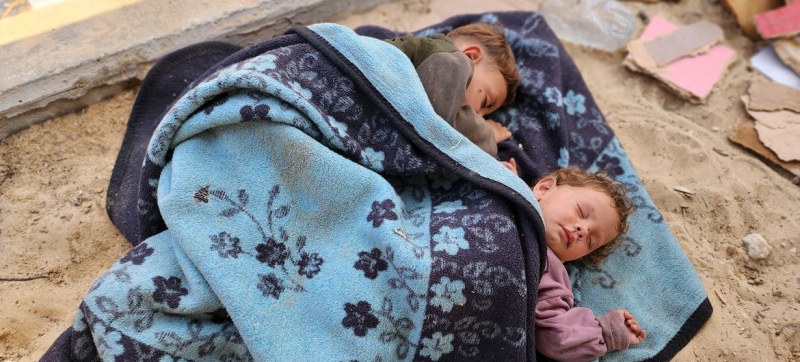
Children sleep outdoors in al-Mawasi, Gaza. Gaza: Humanitarian situation in Rafah becomes increasingly desperate, UN warns Peace and Security
Fighting continued across Gaza on Wednesday, exacerbating existing problems with access to humanitarian aid, including lack of food. However, the main entry routes into the enclave remain closed or too dangerous to access, UN aid workers warned.
The UN Agency for Palestine Refugees (UNRWA) confirmed that the distribution of food aid has been suspended due to ongoing fighting and food shortages.
“The situation in Rafah has deteriorated significantly since the initial evacuation orders were issued there on May 6,” UNRWA spokeswoman Louise Waterage told UN News Service. “As the military operation expanded across Rafah, it severely limited our operations and broader ability to provide humanitarian assistance, services and, in this case, food distribution.”
Lack of Help
“We currently have no access to food distribution centers in the area due to active hostilities, and we are also not receiving supplies through checkpoint,” Wateridge added.
She stressed that UNRWA “has a lot of people on the ground ready to provide assistance and services, but without supply across borders and without access to It is impossible to provide food aid to distribution centers.”
Earlier this week, UN Special Coordinator for the Middle East Peace Process Thor Wennesland warned Security Council members that Israel’s large-scale military operation in Gaza would “further undermine efforts to expand humanitarian supplies and distribute them safely to desperate civilians.” ;
Read also:
INTERVIEW | UN worker in Rafah: “I have never seen such grief anywhere”
Welcoming the opening of the West Erez/Zikim checkpoint in northern Gaza, Wennesland stressed that “nothing can replace a full expanded operation of existing ground crossings.” The UN representative also noted the risks of a “wider spread” of the conflict at the regional level.
Meanwhile, Ireland, Spain and Norway jointly announced on Wednesday that they intend to recognize a Palestinian state. The diplomatic decision to recognize Palestine, which comes into force on May 28, follows months of consultations “with like-minded countries across Europe and the Middle East,” the Irish government said in a statement.
Bakeries under threat
The UN Office for the Coordination of Humanitarian Affairs (OCHA) reported that as of May 18, of the 16 bakeries supported by UN agency partners, only 10 were operational “Their supplies and fuel are expected to run out within a few days unless additional supplies are received,” said Eden Wosornu, a spokeswoman for the agency. She said six bakeries – all in southern Gaza – have closed either due to fuel shortages or ongoing fighting.
No trucks have entered the enclave through the main Rafah and Kerem Shalom crossings since Saturday, according to UNRWA’s humanitarian aid tracking platform. Humanitarian organizations have repeatedly said that at least 500 aid trucks must arrive every day to avoid the crisis worsening.
More than 5,600 aid trucks entered Gaza through both crossings in April, but only about 1,400 vehicles entered the sector in May, UNRWA data shows.
Medical supply shortages
The UN agency also noted that its medical centers have not received any medicines over the past 10 days. However, staff “continue to provide thousands of medical consultations every day in those centers that are still operating,” UNRWA said.
After more than seven months of Israeli bombing, in response to Hamas attacks on southern Israel, nearly one in two Gazans – about 1.1 million people – faces catastrophic levels of hunger, the UN has warned.
According to data obtained by OCHA from Gaza health authorities, more than 35 thousand people were killed and more than 79 thousand were injured during the fighting in the enclave. About 17,000 children were left without adult supervision or separated from their families.
The Israeli military said last week that it had returned the bodies of four Israeli hostages from the sector. “An estimated 128 Israeli and foreign citizens remain captive in Gaza, including the dead whose bodies are being held there,” Eden told Vosorn.
